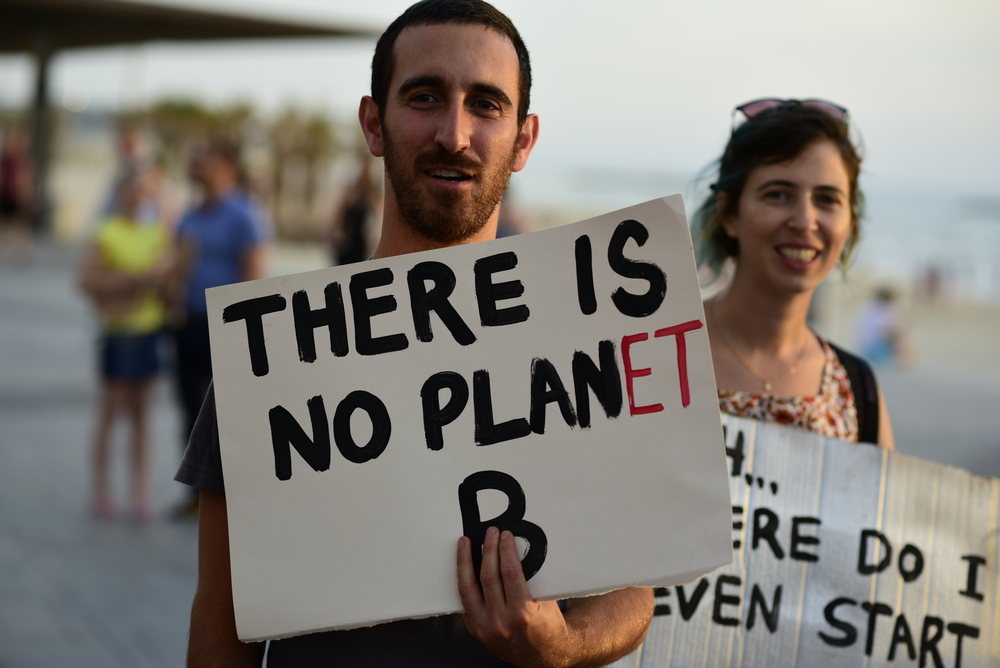
16 Nov Climate Change is Real: 7 Simple Ways to Reduce Your Carbon Footprint
We all know at least one climate change denier whose biggest mission in life is to prove that all the rest of us are crazy for wanting to fix something that ain’t broke.
Typically, they will argue that the earth has gone through various cycles of climate change and that our current situation is just another natural occurrence. They will say that it’s got nothing to do with the industrial, agricultural and daily household activities of human beings and that “really, what’s the fuss about things getting a degree or 2 warmer, anyway?”
We also know how useless arguing with a climate change denier can be. And, unless you find these sorts of debates thrilling (nothing wrong with that) and have the tenacity of a Pitbull, you might want to consider leading by example instead of getting caught up in a battle of wits.
The fact of the matter is climate change is real and carbon emissions from human activity are the main driving force behind it. “Most climate scientists agree the main cause of the current global warming trend is human expansion of the ‘greenhouse effect’ — warming that results when the atmosphere traps heat radiating from Earth toward space,” the NASA website reads.
Now, while climate change certainly requires serious intervention from the highest tiers of government, business and industry, there’s also an individual aspect to it. While many of us may not have the means to switch to greener energy in our homes right away, there are a few small things we can do on a daily basis to help reduce our own carbon emissions.

7 WAYS YOU CAN IMPACT CLIMATE CHANGE POSITIVELY:
-
FIND ALTERNATIVES TO DRIVING

One of the main way’s humans have contributed to climate change is through the burning of fossil fuels, which on an individual basis, happens mostly when driving our own cars, heating our homes or using electricity.
Many of us love the freedom that having a vehicle of our own offers, however, if our mission is to live more consciously, we simply have to cut down on trips. An easy way of doing this is setting concrete reduction goals and sticking to them.
For instance, you can set a goal of walking or cycling anywhere you need to be within 3km of your home. Also, instea
d of driving your own car to work, set up a car pool with people who live in the same area as you. Finally, make use of public transport whenever possible. Familiarise yourself with the bus routes and schedules in your vicinity and opt to hop on board whenever possible.
-
EAT LESS MEAT
According to the Intergovernmental Panel on Climate Change (IPCC), the global livestock industry produces more greenhouse gas emissions than all cars, planes, trains and ships combined. Supporting this finding, a new report published in the journal Nature called for a massive reduction in the quantity of meat being consumed, so as not to push our planet to the edge of extinction by 2050.
Fortunately, cutting down on carnivorous habits seems to have caught on over the past few years, as more and more people are opting for a vegan/vegetarian lifestyle.
If you aren’t quite there yet (or never plan on being), no judgies! The report mentioned above suggests that people start opting for a flexitarian diet, which is mainly plant-based but does allow for the consumption of meat and other animal products in moderation.
But what does moderation mean? Well, preferably only once a week or so. If this still sounds too drastic, why not start with meat-free Mondays?
-
UNPLUG
While we often talk about ‘unplugging’ in a metaphorical sense, many of us may be overlooking the importance of literally unplugging our devices on a daily basis. Even when you’ve flipped the switch on the power supply, any chord plugged into a socket is still drawing a small amount of energy. Now, if you have multiple chords drawing energy across the home on a daily basis this could add up to quite a lot of energy being burned for absolutely no reason.
So, start changing that today by simply unplugging the following appliances before leaving your home:
- Any phone chargers
- Fully-charged laptops
- Desktop computer
- Microwave
- Hairdryer
- Bedside lamp
- TV
By doing this, you will not only be reducing your carbon footprint, but may also find yourself saving on your electricity bill!
-
BUY LOCALLY-SOURCED FOOD

Apart from cutting down on meat, buying locally-grown fresh produce is a great way to ensure that your diet is more eco-conscious.
If you aren’t able to have a veggie garden of your own, you can do this easily by supporting farmer’s markets in your area.
The benefits of doing this are really endless and include the following:
- Buying fruit and veggies sourced within a 100km of your home reduces transport costs and emissions
- You’ll be supporting local entrepreneurs
- Fewer pesticides on fresh produce
- Fewer preservatives in other products, like cheese, milk, meat, honey, jams etc.
-
SLOW DOWN THE FASHION CYCLE
We live in a ‘fast fashion’ culture where the only way to keep up with the latest trends is to fill your shopping basket at your favourite clothing retailer on a regular basis. Have you ever stopped to wonder, however, just how big the impact of your being trendy is having on the environment?
 When you start delving into the facts and figures, the cost of fashion is actually terrifying – not only in terms of pollution and gas emissions, but also as far as its vulnerable workforce is concerned.
When you start delving into the facts and figures, the cost of fashion is actually terrifying – not only in terms of pollution and gas emissions, but also as far as its vulnerable workforce is concerned.
In the US alone, 13 million tons of textiles make it into landfills every year, accounting for 9 percent of total non-recycled waste. The water needed to keep cotton crops healthy and thriving is exorbitant, while the toxic chemicals in dyes seep into our rivers and oceans. Oh, and remember the Rana Plaza factory collapse in Bangladesh, which killed 1138 people? People who worked long hours and got paid less than minimum wage to create garments for fast fashion chains, such as H&M.
Well, here’s a newsflash: being trendy went out of fashion a long time ago!
Instead, we’re seeing a welcome return to timeless elegance and investing in quality pieces made ethically.
If building a more sustainable wardrobe sounds like something you’d like to do, here are a few ways you can start:
- Buy products that have been made locally (check the label on the inside of the garment)
- Delve thrift, second-hand and vintage store shopping
- Fix/tailor/upcycle your own clothing
- Have a clothing swap with friends
Read our guide to a more sustainable wardrobe for more details.
-
PLANT A GARDEN OR SUPPORT A LOCAL FOOD GARDEN

One of the very simplest ways to combat climate change is to grow greenery of your own. And this is true whether you live in a large countryside villa with enough space for a small forest or in a tiny city apartment with only a balcony.
By nurturing trees/plants in whatever spaces available to us, we’ll be increasing the conversion of carbon dioxide to oxygen as well as creating more cool areas. This is especially important in cities that tend to be hotter than surrounding rural areas.
-
COMPOST YOUR FOOD WASTE
Whenever you throw food out with your trash, there’s probably that little twinge of guilt about the wastefulness of the act. With hunger and poverty being rife in all corners of the globe, there’s no doubt that food waste should top the list of modern-day deadly sins.
 Now, let’s just add to that guilt a bit by pointing out that whenever food ends up in a landfill, it will gradually rot and release methane, one of the strongest greenhouse gasses. In fact, according to Climate Central, if food waste could be represented as its own country, it would be the third largest greenhouse gas emitter, behind China and the US.
Now, let’s just add to that guilt a bit by pointing out that whenever food ends up in a landfill, it will gradually rot and release methane, one of the strongest greenhouse gasses. In fact, according to Climate Central, if food waste could be represented as its own country, it would be the third largest greenhouse gas emitter, behind China and the US.
So, instead of throwing your food waste out with the trash, why not start composting instead? Once again, there is an option for everyone – even those who live in small apartments. Even if you don’t have space for a compost heap, you can invest in a special compost bin small enough to be tucked away under the sink in your kitchen. Don’t know what to do with the resulting compost or ‘tea’? Donate it to a local food garden or to a friend/family member who has a garden of their own!
Read our article on reducing food waste to find out more.
8 Free Greener Living Apps to Help South Africans Stay on top of Their Eco Game




Keith Renecle
Posted at 10:30h, 05 FebruaryHi Nadia, thanks for your well written article. I sure don’t agree with some of it, but in general it is a fair appraisal. I enjoy your newsletters and of course your products and good service as well.
I believe that I’m a very open minded person with a solid background in electronics plus a strong interest in general science. . I’m also curious to know the truth in all matters and I enjoy studying the debates in matters like climate change to get both sides of the story.
On your point of unplugging devices when not in use………great idea, except for gadgets that are simply electrical with zero electronics circuits that stay connected. Hairdryers and desk lamps draw zero current when the switch is open so they are no problem.
On your greenhouse gas thing, be very skeptical of the IPCC reports which have been biased towards the huge consortium’s and very rich individuals that have invested billions into green energy which has not brought about the utopia predicted. In fact solar, wind and other so-called green energy costs a huge amount more than coal-fired or nuclear energy. In countries like Germany for example, this concept has back-fired completely.
The so-called 97% of scientists that the IPCC say agree that climate change is due mostly to human interventions is a scam and there is ample proof to back up this statement….. if you have an open mind. Climate change is very real, but it is extremely complex and any honest climate scientist would admit freely that they don’t really know what is causing the current situation. I am certainly no climate denier but good old common technical sense and savvy should tell us that if C02 is only 4% of the greenhouse gas composition, and only 0.04% of the atmosphere, then there simply has to be more to this whole very complex story. I can only encourage you to keep an open mind and check out the facts from scientists with no financial agenda.
Anyway, be well and keep up the good work!
Kind regards, Keith